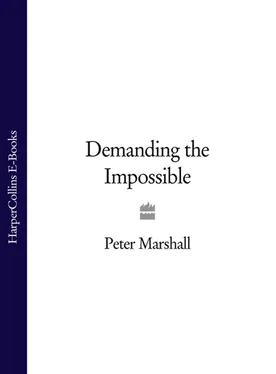Imperturbable and serene the ideal man practises no virtue;
Self-possessed and dispassionate he commits no sin;
Calm and silent he gives up seeing and hearing;
Even and upright his mind abides nowhere. 25
It is an ideal shared by many anarchists who seek simplicity and peace.
In the natural world, there are no grounds for hierarchy or domination and we are all born free and equal. This equality for Buddhism is both spiritual and social. People are spiritually equal in the sense that all are equally capable of achieving enlightenment. In their social life, Zen monks live and work communally. Even amongst teachers and pupils, there should be equal obligation and equal treatment; as some Zen parables put it, ‘no work, no food’, and all should share ‘sour miso’. 26 In wider society, Buddha rejected the caste system and Zen Buddhism in particular is no respecter of persons. One story has it that the Governor of Kyoto came to visit a Zen master and sent in his visiting card with his title on it. It was returned. Only when he sent it in again with his title crossed out, was he received. 27
The Zen Buddhist concept of freedom is also spiritual and social. In a spiritual sense, we are born free. Our fetters and manacles are not the true condition of our existence but forged by our ignorance. Such chains of ignorance, wrought by sensuous infatuation and misused reason, cling to us like wet clothes. But it is the aim of the Zen teachers to help us return to our original state of freedom. Zen tries to break the logjam of our mind, and to free us from the finite world of power, wealth and status. But it attempts this in no fixed pattern. According to Ummon, the great Chinese master, ‘in Zen there is absolute freedom; sometimes it negates and at other times it affirms; it does either way at pleasure.’ 28
The most anti-authoritarian statement in the Zen tradition is probably I-Hsuan’s. Speaking metaphorically, he declared:
Kill anything that you happen on. Kill the Buddha if you happen to meet him. Kill a patriarch or an arhat [saint] if you happen to meet him. Kill your parents or relatives if you happen to meet them. Only then can you be free, not bound by material things, and absolutely free and at ease …
I-Hsuan added, ‘I have no trick to give people. I merely cure disease and set people free …’ 29
We are also free to seek our own salvation. Zen finds no contradiction between free will and determinism. It accepts that there is universal determinism, and that all effects have causes. A man’s character is the sum total of his previous thoughts and acts. Our lives and all existence are ruled by karma , that is to say every action has a reaction. But while the present is determined by the past, the future remains free. Every action we make depends on what we have come to be at the time, but what we are coming to be at any time depends on our will. Every person is thus free within the limitations of his self-created karma . By right thought and action, I can change myself and shape my destiny.
While Buddhism seeks personal enlightenment, it does not turn its back on this world. The seeker in the famous story of the Bull, who eventually tames and releases himself from his worldly self, returns to the marketplace with dusty clothes to find the trees living. Again, while the emphasis in Zen is placed on personal autonomy, others are not neglected. Like the Taoists, the Japanese Zen Master Mumon Ekai commented:
Do not fight with another’s bow and arrow.
Do not ride another’s horse.
Do not discuss another’s faults.
Do not interfere with another’s work. 30
While only the individual can work out his own salvation, he should still think of others. For all its spiritual interests, Zen Buddhism is not an otherworldly mysticism but is concerned with all beings here and now. As the teacher Gasan told his pupils:
Those who speak against killing and who desire to spare the lives of all conscious beings are right. It is good to protect even animals and insects. But what about those persons who kill time, what about those who are destroying wealth, and those who destroy political economy? We should not overlook them. 31
While Zen goes beyond conventional definitions of good and evil, and has no commandments enforced by threat of punishment, certain moral values do emerge in the koans and stories. Evil itself is not considered part of nature but man-made: ‘Nature has no demons; they are human creations’. 32 The fundamental principle which Buddha taught was compassion for all sentient beings. Since life is one and indivisible, whoever breaks the harmony of life will suffer accordingly and delay his or her own development. If I hurt some other being, I therefore hurt myself.
Zen Buddhism also rejects private property and sees the craving for possessions as just another chain preventing spiritual development. In giving and taking, the receiver should not feel gratitude; if anything, the giver, not the receiver, should be thankful for having the opportunity to give. Many Zen Buddhists would like to see an economy based on the gift relationship, not exchange or barter. The most valuable thing however is natural beauty which no one can take or steal.
Buddhism, particularly in its Zen form, thus has, like Taoism, a strong libertarian spirit. Both reject hierarchy and domination. Both seek growth in self-disciplined freedom and assert that all are capable of enlightenment. Both are concerned with personal autonomy and social well-being. They recognize that each person is not only part of society, but of organic nature itself, as many modern anarchists in the West recognize. The voluntary poverty, compassionate harmlessness, and love of life and beauty of the greatest practitioners of Taoism and Buddhism offer a sound moral base for a free society. Above all, the vision of social freedom makes them a major source of the anarchist sensibility, which if properly understood, must pose as a profound threat to any existing State and Church.
THE WORD ANARCHY NOT only came from the Greeks, but it had from the beginning both a negative and a positive sense of living without rulers, in a condition of spontaneous order or of unruly chaos. The mainstream of Greek political philosophy however was rooted in the idea that the search for justice and the civilized life could only be achieved within the confines of the State. Thus for Plato democracy was a form of unjust government which was always ‘anarchical’. His pupil Aristotle referred to those outside the State as ‘lawless dangerous beasts’ and felt that the fundamental problem of democracy was precisely how to prevent it from slipping into ‘anarchy’. But while Plato and Aristotle both felt the need for a hierarchical State with strong laws to maintain social order, not all Greek thinkers were so authoritarian.
Many Greeks drew a distinction between man-made and divine or natural laws. Sophocles depicted the conflict between the two in his great drama of rebellion Antigone ( c .441 BC) When Creon ascends to the throne of Thebes and forbids the burial of the traitor Polynices, his niece Antigone defies his order and gives her brother a token burial. She appeals above Creon’s head to the laws of nature:
For it was not Zeus that had published me that edict; not such are the laws set among men by the Justice who dwells with the gods below; nor deemed I that thy decrees were of such form, that a mortal could override the unwritten and unfailing statutes of heaven. For their life is not of to-day or yesterday, but from all time, and no man knows when they were first put forth. 1
Heraclitus from Ephesus, who lived around 500 BC expressed views remarkably similar to those of the Taoists in China. Known as the ‘riddler’ for the mystical obscurity of his thought, he was the most important of the pre-Socratic thinkers. From the fragments of his work On Nature which remain, it seems he argued that reason should look beyond common sense and realize that the appearance of stability and permanence presented to our senses is false. All things are in a constant flux, even the ‘unchanging’ hills. Everything flows. His follower Cratylus popularized his teaching: ‘You cannot step twice in the same river.’
Читать дальше












